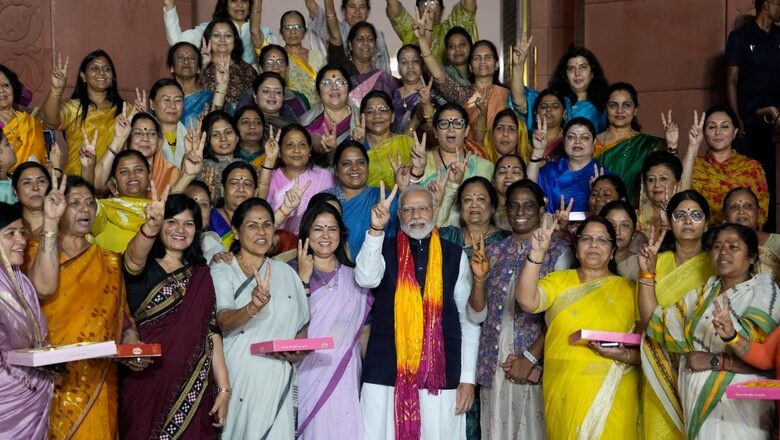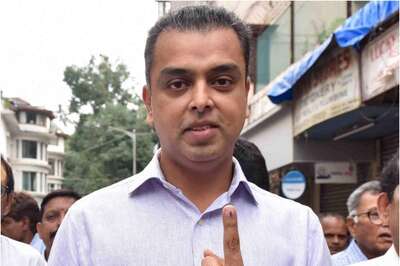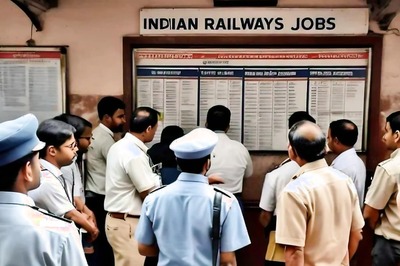
views
“Yesterday, we witnessed history in the making. It is our privilege that the chance to script history was given to us by crores of Indians. The passage of the women’s quota bill will be discussed for generations” –said Prime Minister Narendra Modi, on September 21, 2023.
The Constitution (128th Amendment) Bill, or the Nari Shakti Vandan Adhiniyam and its six clauses were passed on September 21, 2023, with all 214 members present in the Rajya Sabha (Upper House) voting in favour of them. A day earlier, on September 20, the said bill was passed in the Lok Sabha (Lower House), with 454 of the members present voting in favour of the bill and only 2 members from the AIMIM voting against it.
For the longest time, the said bill was called the Women’s Reservation Bill (WRB). The new name, however, showcases nari shakti in all its splendour without trying to stereotype women as “abla, bechaari, helpless or vulnerable” and that in itself is a great beginning. Women will be given a third (33 per cent) of the seats in State legislative assemblies and the Lok Sabha. Within the 33 per cent quota, there is a sub-reservation for SCs and STs. Rotational allocation of reserved seats is an option for several state or Union Territory (UT) constituencies. The seats designated for women will be eliminated 15 years from the said Act’s start date, according to the approved law.
The Women’s Reservation Bill’s tumultuous legislative history started 27 years ago, in September 1996, when it was tabled in the Parliament by the HD Deve Gowda-led administration. Since then, almost every administration attempted to approve it; the UPA administration even succeeded in doing so in the Rajya Sabha in 2010. However, owing to a lack of political will on the part of the then Prime Minister Manmohan Singh and Sonia Gandhi’s kitchen cabinet, the endeavour was unsuccessful as the Congress could not get the needed numbers in the Lok Sabha.
Sonia Gandhi has been trying to appropriate the legacy of this bill, saying that the Congress deserves credit for it. However, the hard truth is that Gandhi and her Congress party could never forge a consensus way back in 2010 and that is precisely why the bill could not be passed in the Lok Sabha at that time. Congress allies — the SP and RJD — refused to support the Congress in 2010 on this issue. What’s even more embarrassing is the fact that many Congress MPs and likes of former Union Railways minister CK Jaffer Sharief revolted against the bill in 2010, and Sonia Gandhi had to finally cave to the pressures from her own party leaders. Even former Prime Minister Atal Bihari Vajpayee introduced the bill in 1998, 2002 and 2003 in the Parliament, but could not bring it to fruition.
Hence, it goes without saying that Prime Minister Modi deserves a huge round of applause for finally translating an idea that was in abeyance for 27 long years into a pleasant reality. He succeeded where others failed. History will remember Modi as the leader who achieved the impossible on a matter that was so contentious for the longest time.
Proponents of reservation say affirmative action is needed to help women. Recent research suggests that reservation empowers women and allocates resources more efficiently. Opponents of reservation say it would prolong women’s inequality since they wouldn’t compete on merit. They say this tactic distracts from election reform concerns like the criminalisation of politics and inner-party democracy. The reservation of Parliament seats limits voter choice to women largely. Rotating reserved seats every election may weaken an MP’s motivation to work for his or her constituency since he or she may not be re-elected is another criticism by those against the Women’s Reservation Bill. But all these criticisms are unfair, unjust and mere rhetoric.
Not only in India but even in developed economies, while women often represent the largest ‘vote-bank’, they are marginalised and find themselves at the fringes in terms of the political decision-making process because, in almost every major global economy, political systems have been inherently patriarchal and male-dominated from time immemorial. However, PM Modi changed all that for India’s 700 million-strong women population last week by doing the unthinkable. Only he could have pulled this off and he certainly did so with such aplomb.
Speaking of reservation for women in the panchayats and urban municipal bodies, Sonia Gandhi recently, wrongfully tried to give credit for it to her late husband Rajiv Gandhi, who tried but failed in 1989. In 1992 and 1993, it was actually the then Prime Minister, Narasimha Rao, who reintroduced the 72nd and 73rd Constituent Amendment Bills for allowing 33 per cent reservation for women in rural and urban local bodies. The bill became law with the approval of both Houses. Till today, over 15 lakh women have been elected at panchayats and Nagarpalikas, thanks to Narasimha Rao, the same leader whose mortal remains were denied entry into the AICC headquarters post his demise in 2004. Rao’s last rites were in complete contravention of established procedures for sitting ex-PMs, thanks to the pettiness of Sonia Gandhi and her cabal, which denied him an official farewell. After obliterating the legacy of Rao, the Congress and Sonia now have the audacity to reclaim Rao as one of their own?
Historically, societal restrictions and discrimination have harmed women. The Delimitation Commission appointed under the Delimitation Act is responsible for deciding the number of Parliamentary and Assembly constituencies to be reserved based on the population. Constituencies in which seats are reserved for the SCs shall be distributed in different parts of the state and located (as far as practicable) in those areas where the proportion of their population to the total is comparatively large. Similarly, constituencies in which seats are reserved for the STs are located (as far as practical) in areas where the proportion of their population to the total is the largest. For instance, the current strength of 543 in the Lok Sabha is based on the recommendations by the Delimitation Commission of 2008, under which 412 seats are reserved for the General category including OBCs, 84 for SCs and 47 for STs. A politically and morally bankrupt Opposition, led by clueless and incompetent Rahul Gandhi, is asking for reservation for OBC women in the Women’s Reservation Bill, very conveniently forgetting that there has never been a separate categorisation for OBCs as per various Delimitation Acts in the past. OBCs have always been a part of the General category for purposes of determining the number of seats in Lok Sabha.
Article 243D (inserted by the 73rd Amendment Act 1992) of the Constitution provides for the reservation of seats for SCs, STs, and women in Panchayats. As per the provisions of Article 243D, not less than one-third of the total number of seats reserved for SCs and STs shall be reserved for women. Speaking of OBC secretaries in the Indian government, an utterly ignorant Rahul Gandhi needs to know that the cutoff limit for empanelment of GoI Secretaries was 1992, while most current secretaries are those inducted/hired before 1992. In fact, demarcation if any, of secretaries into OBCs, SCs, and STs happened only in 1995-96 and that is precisely why there are so few OBCs in secretarial posts within the GoI currently.
The current Lower House has 82 (15 per cent of the total) women MPs. In the Upper House, that percentage is even lower at just 11 per cent. Observing the growing contribution of women in every sector, the bill aims to include more of them in policy-making. In the decision-making process, women can bring different perspectives and enrich the quality of legislative debates and decision-making. However, a rattled Opposition accused the Modi government of “fooling the people” by not bringing in the reservation immediately, and introducing the bill solely with an eye on the 2024 Lok Sabha polls. Needless to add, the Opposition’s baseless allegations are devoid of any merit. If the reservation for women is to come into effect only after the next Census and the delimitation process that follows, with the Modi government rightfully arguing that this is indeed needed to ensure fair distribution of quota, why can’t a fractious Opposition see the logic in this?
Does the Opposition want the BJP to flout Constitutional propriety? Because by advancing the implementation of the 33 per cent quota for women to the 2024 Lok Sabha elections, that is precisely what the Modi government risks doing and by not listening to the Opposition on this, the government is actually upholding duly laid down Constitutional principles. The next delimitation, changing the number of seats in Parliament and State Assemblies, is slotted for 2026. In independent India’s history, delimitation has taken place only four times – 1952, 1963, 1973 and 2002 – till date.
Also, it is to be noted that as per the Constitution (91st Amendment), 2001, which seeks to extend the fresh delimitation till the year 2026, there is, in effect, a freeze on any increase in the number of Lok Sabha seats prior to 2026. As per the provisions in Articles 82 and 170 (3) of the Constitution, no fresh adjustment of constituencies can be undertaken any earlier. Under Article 82, the Parliament enacts a Delimitation Act after every Census. Under Article 170, states also get divided into territorial constituencies as per the Delimitation Act after every Census. Once the Act is in force, the Union government sets up a Delimitation Commission.
The redrawing of the boundaries of an assembly or Lok Sabha constituency is known as delimitation. It is done to reflect changes in the population of a state, a Union Territory, or the entire country. Delimitation is the process of allocating a set number of seats in a State legislature or the Lok Sabha to members of the Scheduled Caste and Scheduled Tribe communities. Thus, the Parliament has enacted a Delimitation Act under Article 82 of the Constitution following each Census. Following that, the Delimitation Commission, a high-powered organisation, is formed to carry out the process of demarcating constituency borders. The Commission’s decisions are legally binding and cannot be challenged in a court of law. An order made by the Commission cannot be changed by anybody; not even by the Parliament. A retired or serving Supreme Court judge serves as the head of the Delimitation Commission. The Chief Election Commissioner or one of the two election commissioners, as well as the election commissioner for the state where the election is taking place, are members too. In addition, associate members of the Commission are chosen from among the state’s five MPs and MLAs. The Commission relies on EC’s workers to carry out the lengthy procedure because it is a transitory body with no full-time staff. Census data is collected for each district, tehsil, and gram panchayat, and new borders are drawn.
Delimitation creates a link between an increase in the population of a state and an increase in the number of elected legislators in that state. It guarantees that no delegates are overrepresented or underrepresented. It equalises the votes of the electorate by balancing the constituencies based on the strength of the electorate. Delimitation aims to preserve a “population seat ratio” across the Union or Federation, as well as across various constituencies within each state. In the Indian context, this justifies reserving seats for SCs and STs as well. The philosophical goal for the entire process is the notion of “one man, one vote, one value”.
Delimitation is a practice that has to be done regularly. Though the population continues to rise steadily, the impact of this is seen after a while, in the form of disproportionate population growth in various states and districts. As a result, delimitation is needed to balance the population in different states and constituencies at specified predetermined intervals. The Modi government, therefore, is absolutely right in ensuring democratic processes are duly adhered to before the Nari Shakti Vandan Adhiniyam is affected.
“God has chosen me for many pure deeds. We will write history today. Nari Shakti Vandan Adhiniyam will strengthen democracy and further our resolve of women-led development,” PM Modi said in the new Lok Sabha, announcing his government’s move to table the Constitution (128th) Amendment Bill 2023. He sought a consensus on the passage of the law that had been in the works since September 1996, when the first draft was tabled in Parliament. In its current form, the bill seeks to amend four Articles of the Constitution (239AA, 330A, 332A and 334A) to provide 33 per cent reservation for women in the Lok Sabha, state legislative assemblies and Delhi Assembly, provide one-third quota for SC/ST women within the 33 per cent bracket in the Lok Sabha and cap the reservation benefits at 15 years, unless the Parliament wants to extend the period.
The PM personally piloted the Women’s Bill, terming it an extension of BJP’s “pro-women governance”, whereby over 70 per cent of Mudra loans, 80 per cent of startup loans, and over 70 per cent of Jan Dhan account beneficiaries have been women. “Some decisions can change the course of a country’s future. The successful passage of the women’s reservation bill in Parliament is one such decision,” is yet another iconic quote by PM Modi. Truer words have not been said.
Various governments tried and failed. From lending his support and putting his personal capital at stake in ensuring Droupadi Murmu becomes the first tribal woman as India’s President, to ensuring 37 per cent of his Cabinet members are OBCs, 11 SCs and 8 STs, PM Modi has done more for OBCs, Dalits and Adivasis, than any of his predecessors. At 85 MPs, the BJP has more MPs in the Lok Sabha who are OBCs than the total number of MPs that the Congress has in the Lower House. Remember, the Congress only has 52 MPs in the Lok Sabha. Again 27 per cent of BJP’s MLAs and 40 per cent of MLCs are OBCs; the 1st OBC Prime Minister of India, the enigmatic Narendra Modi, is also from the BJP. Hence the BJP certainly does not need any lessons or lectures on empowerment of OBCs or women for that matter from the likes of Rahul Gandhi or the irrelevant leftist cabal.
An idea, they say, is only as good as its execution. And indeed, the credit for bringing this idea of 33 per cent reservation for women to fruition goes to none other than Prime Minister Modi, who translated what was just a powerful idea into something that will now shape the destinies of many Indian women, by becoming a legislation and an effective policy apparatus. PM Modi has proved yet again that where there is formidable willpower, impossible is nothing.
Sanju Verma is an Economist, National Spokesperson of the BJP and the Bestselling Author of ‘The Modi Gambit’. Views expressed in the above piece are personal and solely that of the author. They do not necessarily reflect News18’s views.
















Comments
0 comment